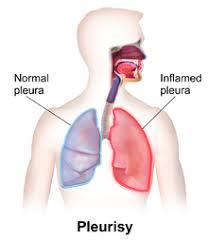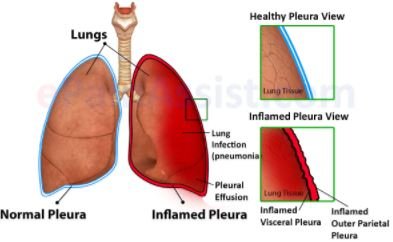What is Pleuritis?
Pleuritis is a condition that causes inflammation in your lungs and is accompanied by chest pains while breathing. Pleuritis is also known as pleurisy. Inside your body there is a membrane known as pleural which is made up of different layers of tissues that lines the tissues in the lungs and inner chest cavity. When this membrane is inflamed, it causes pleuritis1.

Normally, when you breathe, the pleura rub together. But when the pleura are inflamed, the rubbing causes pain in your chest as you breathe.
Causes of Pleuritis
Pleuritis occur as a result of many causes such as3, 4
Bronchitis
Bronchitis is an illness that causes inflammation and swellings in your lungs. There are two types of bronchitis: acute and chronic bronchitis. Acute bronchitis occurs as a result of viruses which attack air passages causing inflammation and increased production of mucus. The virus can spread to another person through sneezing.
Chronic bronchitis is a type of chronic obstructive pulmonary illness that irritates your airways. This illness is mostly caused by smoking. Exposure to chemicals, dust and second hand smoke can also make you develop chronic bronchitis.
Pneumonia
Pneumonia is an illness that affects your lungs. There are many types of pneumonia such as dust pneumonia and bacterial pneumonia. Bacterial pneumonia is an illness that occurs when bacteria invades your lungs and cause an infection. Bacteria can enter your body when you come into contact with surfaces that contain these microorganisms.

Pancreatitis
This is a condition that causes your pancreas to become inflamed. Pancreas is an organ that is responsible for secreting hormones to reduce blood sugar as well as it aids in digestion. In case your pancreas is inflamed, your body will be unable to regulate blood sugar and assist in digestion of food.
Pancreatitis is caused mainly by excessive consumption of alcohol. Drinking excess alcohol for a long period of time can damage your liver, pancreas and lungs.
Tumors
Overgrowths in your chest and lungs may also cause inflammation in your lungs.
Fractures
Direct injury to your chest may damage your ribs. This damage can extend and hurt your lungs leading to inflammation. You may be involved in an accident such as falling from a building or being hit by a sharp object on your chest which can damage your lungs.
Autoimmune disorders
Autoimmune condition occurs when your immune system wrongly attacks organs in your body such as lungs. This may damage your lungs leading to inflammation. An example of an autoimmune condition is lupus.
Wounds
Wound in your chest may cause inflammation in your lungs. This occurs when the infections spreads to your lungs and cause an inflammation.
Blood clots
Presence of clots in the artery of your lungs can cause inflammation.
Symptoms of Pleuritis
The main symptom of pleuritis is sharp pain in your chest that you feel when you breathe. This pain may disappear when you exert pressure to the painful area or as you breathe. The pain may worsen if you cough, move or sneeze. You may experience loss of appetite, chills and fever1.
Other symptoms you might experience include:
You may feel pain on one side of your chest, back and shoulders. Pain in your joints and muscle aches are also common. You may also have headaches and shortness of breath.
Diagnosis of Pleuritis
Pleuritis can be diagnosed through a physical exam and other tests. In physical exam, your doctor asks your medical history to find out more information about your condition4.
The following tests can be ordered by your doctor:
Biopsy
Biopsy can be used to find out the cause of pleuritis. In this procedure, your doctor makes a small incision into your chest wall and uses a needle to extract a sample of the tissue of pleural membrane. This tissue is taken to the laboratory for analysis to find out whether an infection is the cause of the problem.
Alternatively, your doctor may conduct another procedure known as thoracoscopy to remove a sample of a tissue of pleural membrane. In this method, a tube with a camera attached on its end is inserted into the pleural space after your doctor makes an incision into your chest wall and extracts a tissue for analysis.
Ultrasound
In ultrasound, high frequency sound waves are used to create detailed pictures of your chest structures. These pictures will assist your doctor determine the cause of pleuritis.
CT scan
Your doctor will take detailed cross-sectional images of structures in your chest using CT scan. The images will reveal the areas that are irritated in your chest.
Chest X-rays
X-rays on your chest will be done to find out if there are inflammations in your lungs. Your doctor may also order decubitus chest X-ray which is done when you are lying on your side. This test is done to find out if they are fluid buildup in the pleural cavity.
Blood tests
Blood tests are done to find out if an infection is the cause of pleuritis. It will reveal the cause of the infection and whether you have an autoimmune disorder. In this procedure, your doctor collects a sample of your blood and analyses it in the laboratory to confirm the cause of pleuritis.
Treatment
Successful treatment of pleuritis depends on correctly identifying the cause and treating it properly. The following treatment options are used to cure pleuritis3:
Antibiotics
In case the cause of the pleuritis is bacterial infection, your doctor will prescribe antibiotics to treat it.
Anti-inflammatory drugs
Your doctor will suggest painkillers and anti-inflammatory drugs such as ibuprofen and aspirin to ease inflammation and pain.
Other drugs that can be prescribed by your doctor include:
- Medications that suppress cough can be administered to reduce coughing.
- Drugs that dissolve blood clots are also used to remove blood clots in your blood vessels.
- You will also need inhalers to help you breathe properly.
- In case there is fluid buildup in the pleural cavity, you will be hospitalized so that your doctor can drain out the fluid to ease pain in your chest.
People with pleuritis need enough rest to alleviate pain. They have also to avoid exerting excess pressure on your lungs during sneezing or coughing.
Reference List
- Pleuritis. https://www.belmarrahealth.com/pleurisy-pleuritis-lung-inflammation-causes-sharp-chest-pain-with-breathing/
- Pleuritis. http://www.merckmanuals.com/home/lung-and-airway-disorders/pleural-and-mediastinal-disorders/viral-pleuritis
- https://www.healthline.com/health/pleurisy#diagnosis4
- Pleuritis. https://www.medicinenet.com/pleurisy/article.htm
